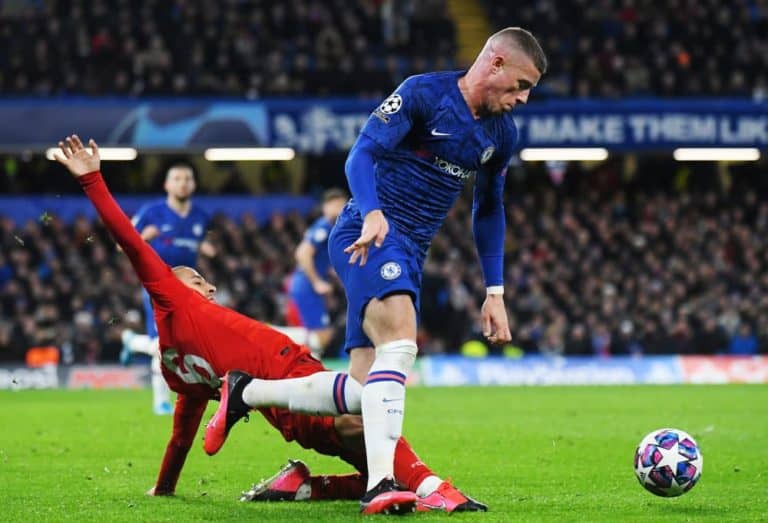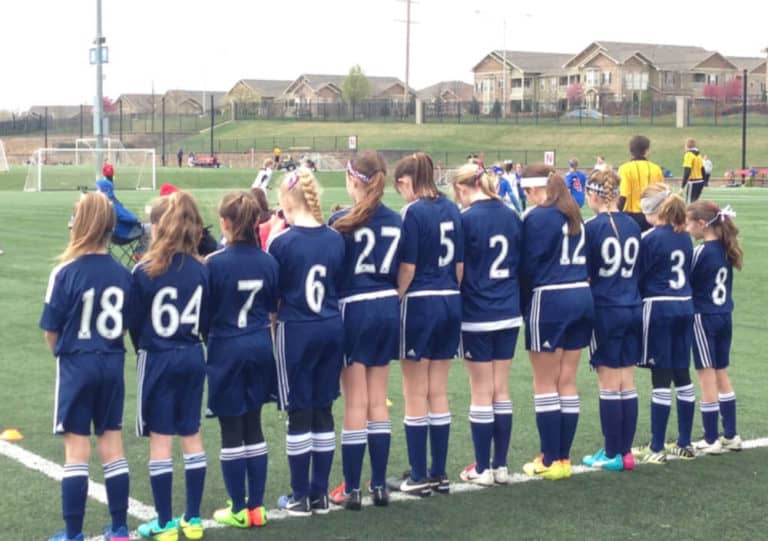10 Signs Your Kid is Great at Soccer
Many soccer parents imagine their kid is going to be the next Lionel Messi or Alex Morgan and tear up the soccer world, but, at a young age, how do you know your kid is good at soccer? What signs should you be looking for that your child may be special and need a little extra attention?
Here is a list of 10 signs your kid is great at soccer that I will break down in this post:
- Your Kid is the Fastest Player on the Field
- Your Kid Never Gets Tired
- Your Kid is Super Quick
- Your Kid is Physically Strong
- Your Kid Thrives in the Spotlight
- Your Kid Thinks Fast
- Your Kid Scores Goals Consistently
- No One Can Get Past Your Kid on Defense
- Your Kid is Good at the FIFA Video Game
- Your Kid is Touching the Ball Constantly

As you may have read in What’s Wrong With Winning, before about age 10, pure athleticism will lead to soccer success. A healthy dose of size, strength and speed will trump soccer skill at the youngest ages. As players mature, other factors start to influence success. In How to Make Your Child a Soccer Star (Kind Of), I examined the three ingredients of a soccer star – athleticism, personality and opportunity. Notice that athleticism is always going to be paramount, but personality and opportunity will eventually play a role as well.
The difficulty is breaking down these conceptual characteristics into more objective measures to help determine if your kid is great at soccer. Ultimately, in a lot of respects, you’ll be looking for the same qualities as a competitive coach at a soccer tryout.
1. Your Kid is the Fastest Player on the Field
This is simple straight-line foot speed. If your child is just faster than other kids, he or she has a good building block for being great at soccer. Soccer involves a LOT of running (see How Far Do Youth Soccer Players Run in a Game). Exceptional speed for the bursts that are required to break behind a defender, catch-up to a streaking opponent or be first to a 50/50 ball will help your child be good at soccer.
At the highest levels of soccer, the best teams will usually have a player or two that are just freakishly fast. Those players are constantly a threat on offense and a lifeline on defense. They will likely have an advantage over any team that cannot match their speed. Fast players are absolutely difference makers.
Speed is maybe the easiest quality to measure. Kids tend to like to race their peers. If your child is consistently coming out on top in those races, he or she likely has enough speed to be a good soccer player. On the other hand, if your child struggles to keep up, he or she might not have what it takes to be a high level soccer player (but stay tuned, there are a lot of other factors to consider!)
Keep in mind that kids do develop at different rates. If your child is fast merely because he or she is more developed than his or her peers, then the speed advantage might not last. I coached an early developed girl that relied 100% on her speed for everything that she did on the soccer field. She was very successful at younger ages and scored a ton of goals. However, once some of the other girls developed, she was no longer the fastest player on the field, and she struggled mightily.
Speed is a key ingredient to a great soccer player, but there are plenty of other qualities to consider.
2. Your Kid Never Gets Tired
Endurance is essential for a great soccer player. If your kid can run forever without getting out of breath and never needs a sub in a soccer game; or, if your kid can play outside all day without taking a break, then he or she likely has the stamina to be good at soccer. As I mentioned, soccer involves a ton of running, so being a good distance runner is pretty important.
Unlike speed, which really cannot be taught (although it can be tweaked), endurance can be developed. That said, it simply comes naturally to some kids. Those with the most natural endurance will have an advantage.
In addition to playing club soccer, my daughter ran cross-country in middle school. At one of the largest meets of the year (with hundreds of participants), the top 3 finishers of the girls A-level race were all soccer players that I had coached at one point or another. Another player I coached was in the top 10 — and those are just the ones I know were soccer players, there were likely others that I just didn’t know. Soccer and endurance go hand in hand.
3. Your Kid is Super Quick
This is different than the speed discussed above. Not all fast sprinters are quick. Quickness involves, perhaps most importantly, the first reaction step. How fast does your child react in a soccer game? Does he or she jump up immediately when the phone or doorbell rings? Can he or she catch a dropped hairbrush before it hits the floor?
Quickness also involves changing direction. Think Lionel Messi, here. Messi isn’t a particularly fast sprinter, but he changes direction like no other player.
When I was a kid, we used to do shuttle runs in PE. Two items (usually chalkboard erasers!) were placed about 25 yards from a starting point. We would have to run and get the first one, bring it back to the start and then run again and grab the second one and bring it back to the start. Sprinting speed played a role, but those kids that could change direction on a dime were the most successful.
That sort of quickness is important in soccer. Soccer involves hundreds of changes in direction and first steps. If your kid has that quickness, then there’s a good chance he or she could be good at soccer.

4. Your Kid is Physically Strong
Soccer is a contact sport! Maybe at the younger ages, less so, but as your player advances, the game becomes very physical. Great soccer players need the strength to hold opponents off when in possession and push opponents off when defending.
This is not weight lifting type strength, but more core strength. Perhaps a better way to say it is that the player needs to be solid or sturdy. If players tend to bounce off of your kid at soccer games and he/she doesn’t often find himself/herself getting up from the turf after being mauled in a tough challenge, then your kid might be able to be great at soccer.
Keep in mind that, while size does play a role in strength, too much size can adversely impact speed, quickness and endurance. Also, kids develop strength at different rates. Just because a child is weaker now, doesn’t mean that child will be weaker as he/she grows.
One aspect of strength that probably shouldn’t be focused on is kicking strength. Kids who can kick hard tend to have a lot of success in soccer at younger ages. Corner kicks go further, shots are harder etc. I’ve seen some players sacrifice kicking form in order to get more power (the dreaded toe ball). That is a mistake. In my experience, most soccer players develop sufficient kicking strength at some point. Those that have either been relying on kicking strength for success or sacrificing form for power will find themselves at a disadvantage when the other players catch up.
5. Your Kid Thrives in the Spotlight
Like most sports, soccer is a game for the bold. It can be difficult for a shy player who shuns attention. When a player has the ball, the spotlight, so to speak, is on. Great soccer players are not afraid of the spotlight – they crave it.
Watch what happens when your kid has the ball in a soccer game. Does he/she panic and look to get rid of it as quickly as possible? Or is he/she as cool as a cucumber? Serenity in pressurized situations is key to effective decision making.
Watch what happens when your kid doesn’t have the ball. Is he/she constantly looking for ways to get the ball? Shy players tend to hide when the pressure is on. In this context, hiding is when a player puts himself/herself in a position in which they will not be able to get the ball. A great player will work tirelessly to get open for a pass. A shy player will never quite be available.
Those players that can handle pressure will want the ball and operate well when they have it. They welcome the attention that having the ball brings. That personality trait and attitude will help make them be a great soccer player.
6. Your Kid Thinks Fast
A soccer game involves hundreds of decisions that must be made in a split second. A child who likes to ponder and contemplate may struggle with the speed and pressure of intense soccer situations.
When your child is playing soccer does he/she hesitate when he/she has the ball? Or is your kid instantly decisive and instinctual? Does your child wait for instruction from the coach, or is he/she ahead of the game?
Quick decisions allow players to think ahead and anticipate the game. Good anticipation allows players to be proactive rather than reactive. You will see this on the field. Reactive players are always chasing the ball and never in the right position. Proactive players will be stealing balls and intercepting passes. Great soccer players are proactive.
In practices, I coach my players to be proactive by constantly asking “what’s going to happen next?” It takes fast thinking to handle the present and figure out what’s going to happen next, but that’s a requirement to be great at soccer.
Often in soccer, you will hear references to “speed of play”. This is not a reference to the physical speed of the players, but rather how fast the game is being played. The ability to think fast will increase the speed of play. The speed of play for great soccer players is extremely fast.
7. Your Kid Scores Goals Consistently
If you look at a list of the greatest soccer players of all time — Ronaldo, Messi, Pele, Maradona, Alex Morgan, Mia Hamm — many of them are goal scorers. Scoring goals is one of the hardest things to do in sports. It takes a great soccer player to score goals consistently.
Interestingly, scoring goals is a skill in and of itself. One might think that the fastest and most technically gifted players would be the goal scorers, but that’s not always the case. There is no single formula for scoring goals.
I’ve seen many great scorers who weren’t particularly quick, overpoweringly strong or technically adept. They just had a “knack” for finding the back of the net. But, that knack is incredibly rare, so if your kid has it — even if they don’t necessarily pass the eye test of playing soccer beautifully — they could be great at soccer.
Also, note “consistently”. Scoring goals against weak competition is not indicative of a great soccer player. I’ve seen the following scenario play out many times over the years: Player A scores multiple goals every time Player A’s team plays against lesser teams, but disappears when Player A’s team plays better competition. Player B only scores one or two goals against lesser teams, but continues to score one or two goals against better competition as well. Player A’s statistics may look flashier, but Player B’s ability to score goals consistently is more valuable .
8. No One Can Get Past Your Kid on Defense
Defensive ability can be just as valuable as goal scoring. Defense takes skill, timing and quickness.
But, like scoring goals, defense is more than that. Two of the most important qualities of good defenders are anticipation and angle recognition. Note that I did not list speed. That is not to say that speed is not important, but a slight deficiency in speed can be made up for with good anticipation and playing angles properly.
Anticipation goes back to fast thinking. Your kid may be great at soccer if he/she can size up an attack quickly, and effectively stop the attack by thwarting the attacking player’s intention before the attacking player can even initiate the sequence. If your kid is forcing mistakes and intercepting passes, he/she is playing with excellent anticipation.
Playing angles properly is not something coaches can easily and specifically teach. Some kids will naturally see an angle and cut it off rather than chasing a play. Other kids can learn the same thing through experience. Proper angles are essential in making up for speed differences and keeping attacking players out of dangerous areas.
To put it in terms of another sport. Defenders are somewhat like baseball or softball outfielders. They must see and react quickly. Then, they must take the best angle to make the play.
9. Your Kid is Good at the FIFA Video Game
This one is a little strange, but if your kid is good at FIFA, he/she could be great at soccer. Obviously, being good at FIFA alone may just mean he/she is good at video games, but FIFA is actually a very good simulation of the real game.
To be good at FIFA, you have to be good at spacing, quick decisions and “runs” off of the ball. These are all key in an actual soccer game as well. If your kid can think the game well in FIFA, then he/she can probably think the game well in real life.
10. Your Kid is Touching the Ball Constantly
Great soccer players are extremely comfortable with the ball at their feet. Players like Neymar and Megan Rapinoe can absolutely make magic with a soccer ball. This ability comes from countless hours of dribbling a ball, juggling a ball, and just plain old touching a ball.
Ball mastery takes time and effort. The more time your child spends with the ball, the more natural it will feel.
There are several ways to promote more touches on the ball such as keeping track of a juggling record or encouraging Techne work. But, while touching a ball is something you can encourage, it’s not something that you can force. Your kid has to want to do it.
I’ve seen players who were basically inseparable from their soccer balls. One of my neighbor’s kids used to juggle the ball everyday while waiting for the bus to come. If he wanted to visit a friend he would juggle the ball while he walked down the street to his friend’s house. His touch was amazing!
If your kid constantly has a ball at his/her feet whether on the field or off, he/she may be pretty great at soccer.
Soccer Parents Should Be Realistic
Every soccer parent wants their child to be a great soccer player, but it’s hard to be objective when it’s your kid. Unfortunately, in their quest for soccer greatness, some parents may move their children up to levels that are so high that they’re not conducive to the development of their children — and it isn’t fun. If you want to support your child’s dream of soccer excellence, but you’re not sure if they’re great at soccer, look for the 10 signs above and be realistic!







